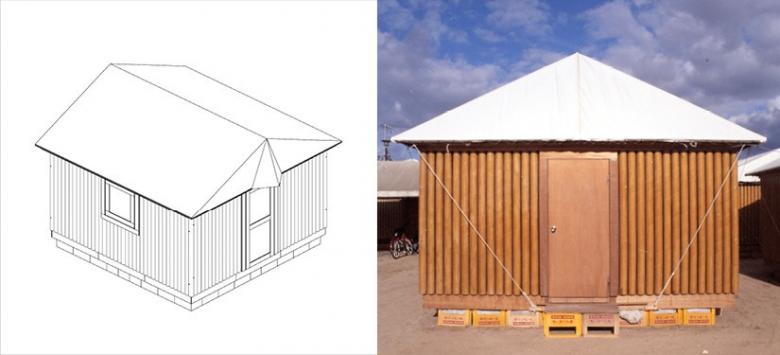Shigeru Ban: The Paper Log House
Shigeru Ban: The Paper Log House at The Glass House marks the first time in six years that the innovative house will be on display in North America. In collaboration with The Irwin S. Chanin School of Architecture of The Cooper Union, 36 architecture students will gain hands-on experience assembling the Pritzker Prize-winning architect Shigeru Ban’s Paper Log House, a 14 by 14-foot enclosure made of paper tubes, wood and milk crates deployed to provide temporary housing for victims of disaster across five continents over the last 30 years. As part of a special project offered through the school’s Building Technology course this semester, students will fabricate the components at The Cooper Union then assemble the Paper Log House on the grounds of The Glass House, where it will remain on display through the upcoming tour season, April 15 – December 15th, 2024.
“We are thrilled to present the work of Shigeru Ban Architects at The Glass House on the occasion of our 75th anniversary. When the Glass House and Brick House were completed in 1949, Philip Johnson was just at the beginning of what would become an expansive campus filled with structures and sculptures that continually pushed boundaries in design and materials over the course of more than 50 years. The Paper Log House continues this ethos. Since 1995, Paper Log Houses have been deployed around the world for victims of natural disasters. By using locally available and reusable materials in novel ways, the design of the house adapts to the unique cultural, geographical, and economic conditions of each location. The team from Shigeru Ban Architects and the students from The Cooper Union’s architecture program join us in reaffirming that innovation and experimentation at The Glass House is alive and well,” said Glass House executive director, Kirsten Reoch.
Known for his innovative use of paper and wood, architect, educator, and humanitarian Shigeru Ban [b. 1957] originally designed the Paper Log House in 1995 as a shelter for former Vietnamese refugees displaced by the Great Hanshin Earthquake in Kobe, Japan. Designed to be low cost and easy to assemble, Ban utilized paper tubes as the house’s primary building material because they are readily available, economical, and sustainable nearly anywhere in the world. Born out of his desire to not make waste, his experiments with paper tubes began in 1985, and, since then, he has pioneered paper tube construction, elevating the humble material through installations, buildings, and disaster relief projects around the world. Many of his relief projects, such as Cardboard Cathedral in 2013, have gone on to become permanent fixtures in their communities.
The opening of Shigeru Ban: The Paper Log House at The Glass House in New Canaan creates a unique opportunity to reflect on the permanence of architecture, and how disparate building materials, namely glass, brick and paper offer unexpected possibilities. Ban famously noted, “If a building is loved, it becomes permanent.” In creating buildings that are meaningful to and cared for by their communities, Shigeru Ban’s inventive work alongside The Glass House challenges preconceived notions of permanence and material strength. Visitors will be able to consider the value of both historic preservation and permanence in glass and brick juxtaposed with temporary, recyclable, and movable structures made of paper and cardboard. In today’s world of mass migration, due to conflict and natural disasters, the public can see a simple solution for aiding those in need of immediate shelter. The Paper Log House will be complimented by a digital brochure and a time-lapse video documenting its construction throughout The Glass House’s 2024 season.

L: Paper Log House diagram. R: Paper Log House, Kobe, Japan
- Wann
- 15. April bis 15. Dezember 2024
- Wo
-
The Glass House
199 Elm Street
06840 New Canaan, USA - Organisator
- The Glass House
- Link
- More information
Magazin
-
Zen and the Art of Watercolors
vor 5 Tagen
-
International 2024 Piranesi Award
vor 6 Tagen
-
Sculpted by the Sun
vor einer Woche